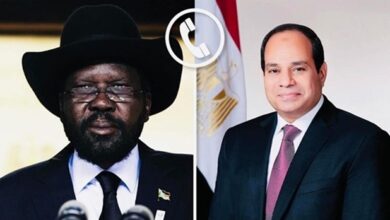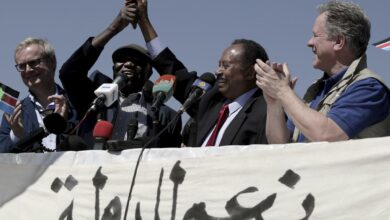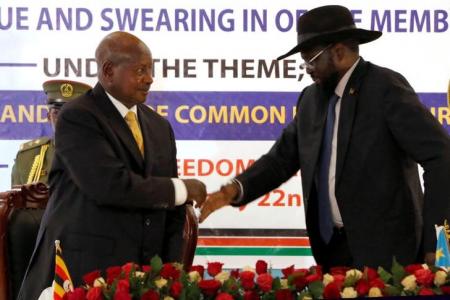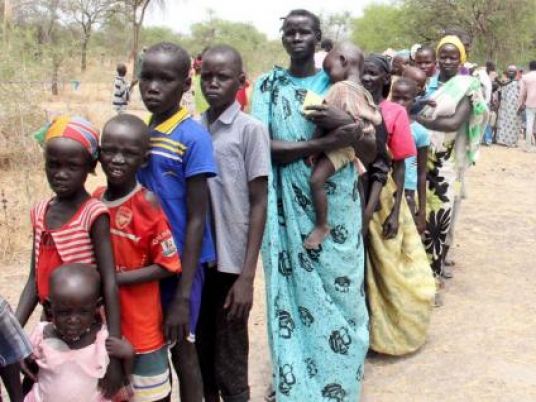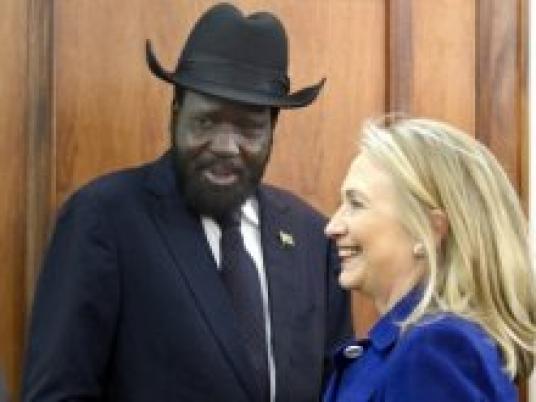
Talks in the Ethiopian capital Addis Ababa between South Sudan's President Salva Kiir and rival rebel leader Riek Machar ended Friday without a peace deal as a draft African Union report called for both men to be excluded from politics.
Ethiopia's Prime Minister Hailemariam Desalegn announced in a statement that, regretfully, the talks “did not produce the necessary breakthrough” to end the violence that has killed tens of thousands of people in more than a year of fresh unrest.
“The consequences of inaction are the continued suffering of you, the people of South Sudan, and the prolonging of a senseless war in your country,” Desalegn’s statement said.
“This is unacceptable, both morally and politically.”
Kiir and Machar were given a 5 March deadline to strike an agreement that included a power-sharing deal that would pave the way for a unity government, but mediators extended the talks until Friday.
In mid-February, South Sudan's cabinet postponed general elections until 2017 and extended the mandates of both President Kiir and parliament by two years. The move effectively reneged on a deal signed earlier in February in which Kiir and Machar agreed to set up a transitional unity government that would take power on 9 July and rule for 30 months, with Kiir remaining president while Machar would be re-appointed vice president.
The two leaders have also signed – and then broken – at least six earlier ceasefire agreements.
Armed forces in the South Sudanese capital of Juba appeared to splinter along ethnic lines in December 2013 when Machar mounted a challenge to Kiir’s leadership. Since then, sporadic violence has erupted as government forces loyal to Kiir, an ethnic Dinka, try to put down the uprising led by Machar, an ethnic Nuer who was Kiir’s vice president before he was sacked in July 2013 and accused of plotting a coup.
In the violence that followed almost 100,000 civilians have fled to UN bases for protection, with government troops and fighters accused of waging terror campaigns of rape and killing. Humanitarian groups say at least 36,000 people have been newly displaced since the beginning of January.
The UN said in February that gunmen had abducted at least 89 boys, some as young as 13, from their school in Upper Nile State to be used as child soldiers. The UN children's agency UNICEF later said it feared the number of abducted children may be in the hundreds.
UN imposes one-year deadline
UN chief Ban Ki-moon expressed profound disappointment over the failure of Kiir and Machar to “display statesmanship” and reach a deal. Ban had spoken with both parties in the past two days to offer support and urge them to come to an agreement.
The threat of UN sanctions also now hangs over Kiir and Machar after the Security Council this week unanimously approved the creation of a system to impose targeted sanctions on those "blocking peace".
In a report released Friday, Ban proposed a one-year test period to determine whether the troubled UNAMID mission in Sudan's Darfur led jointly by the United Nations and the African Union can be salvaged. In a special review to the Security Council, Ban proposed that during this time period, "efforts to address troop- and police-contingent shortcomings would be redoubled" to improve mobility and patrols.
The UN is working on a plan to streamline the joint mission and transfer some of its tasks to a team solely under UN control, the report said.
Since its deployment in 2007 the mission has been plagued with problems, mostly stemming from its dual-command structure that allows both the United Nations and the African Union to run operations.
The mission is tasked with protecting civilians and securing humanitarian aid in the western region of Sudan, where more than 300,000 have been killed in 11 years of conflict. More than two million people have been forced from their homes, but the mission has often been barred from accessing conflict areas and its forces have been targeted in attacks.
There have been growing calls from Khartoum for the 16,000-strong UNAMID force to pull out after the mission demanded access to a village to investigate claims that Sudanese troops had launched a campaign of mass rape against the women and girls there.
Denying access to the UN-AU force in the future would be immediately reported to organizations’ headquarters, Ban said.
The UN chief laid out three scenarios for after the one-year deadline, including streamlining the mission, strengthening peace-building efforts or considering "hard decisions on the future of UNAMID" if no improvements are seen within this timeframe.
AU calls for barring rivals from power
A draft African Union report on the civil war in South Sudan calls for the country to be handed over to internationally mandated caretakers and its warring leaders barred from politics.
The draft report of the AU Commission of Inquiry on South Sudan, obtained by AFP, accuses Kiir and Machar of direct responsibility for the country's 2013 political crisis and the war that followed.
Former Nigerian president Olusegun Obasanjo, who led the commission, submitted a final version of the report in January but it was shelved by AU officials over fears its publication before negotiations were complete might undermine the peace talks.
"Key to the pursuit of political justice in the transitional period is the exclusion from high office of all those held politically accountable for the mass violence that followed the crisis of 15 December 2013," the draft said.
The commission recommends that control of South Sudan be handed to a three-member, AU-appointed and UN-mandated "oversight panel", thereby cutting the "unaccountable political class" out of running the country.
But the AU report did not only lay the blame for the conflict on South Sudan's rival political factions. Previous peace deals, it said, had created a culture of violence and impunity.
Regional African governments and the international community — in particular Britain, Norway and the United States, known as the "troika" — helped formulate a flawed 2005 peace deal that ended decades of civil war between Sudan's north and the south but enthroned the rebel army as southern leaders.
This 2005 agreement "set up a politically unchallenged armed power in South Sudan, one that could act with impunity, thereby legitimizing both anyone holding a gun and the rule of the gun", the draft said.

